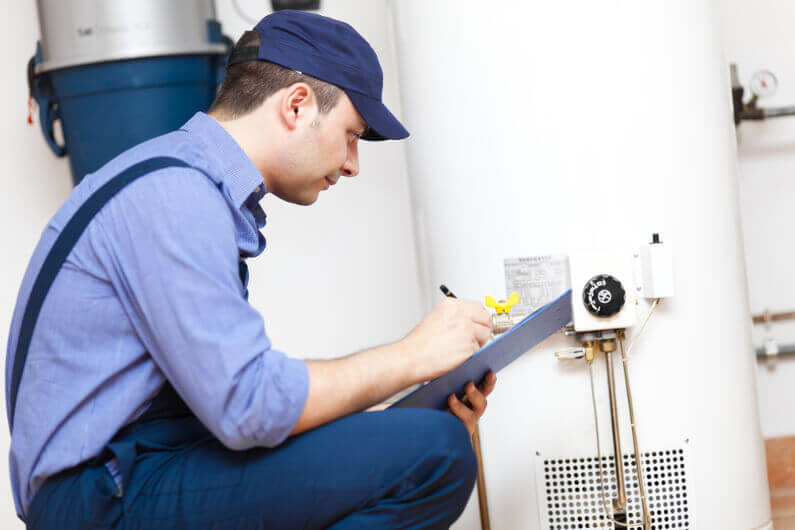6 Common Signs That Point to Your Water Heater's Impending Failure
6 Common Signs That Point to Your Water Heater's Impending Failure
Blog Article
What're your beliefs about When Should You Replace Your Hot Water Heater??

Sometimes, the lag in your heating unit is just a result of bathing way too much or doing loads of washing. There are instances when your devices needs dealing with so you can continue taking pleasure in warm water. Do not wait on broken water heaters to offer you a large headache at the top of wintertime.
Rather, discover the indication that indicate your water heater gets on its last leg prior to it completely collapses. When you discover these 6 red flags, call your plumber to do fixings before your machine absolutely fails and leaks everywhere.
Listening To Unusual Seems
When unusual sounds like knocking and tapping on your equipment, this shows sediment build-up. It belongs to sedimentary rocks, which are hard and also make a lot of noise when banging versus steel. If left neglected, these pieces can produce splits on the steel, creating leakages.
You can still save your water heating unit by draining it and cleaning it. Simply take care because taking care of this is dangerous, whether it is a gas or electrical device. Put on safety glasses, handwear covers, and also protective garments. Most importantly, make certain you understand what you're doing. Otherwise, it is better to call a specialist.
Making Insufficient Warm Water
If there is not enough hot water for you and also your family, yet you have not transformed your usage behaviors, then that's the sign that your water heater is failing. Normally, growing families and an added restroom indicate that you have to scale as much as a bigger system to fulfill your demands.
However, when whatever coincides, however your water heater suddenly does not fulfill your hot water demands, consider a specialist assessment because your equipment is not doing to criterion.
Experiencing Variations in Temperature
Your water heating unit has a thermostat, and the water generated ought to remain around that exact same temperature you establish for the unit. If your water ends up being also cold or also warm all of an unexpected, it can imply that your water heating system thermostat is no longer doing its task.
Seeing Pools and leaks
Check to pipelines, ports, as well as screws when you see a water leakage. You might simply need to tighten up some of them. Nonetheless, if you see puddles gathered at the end of the home heating unit, you should ask for a prompt evaluation since it reveals you have actually obtained an energetic leakage that could be an issue with your tank itself or the pipes.
Noticing Smelly or cloudy Water
Does your water suddenly have an odor like rotten eggs as well as look unclean? If you smell something weird, your water heating unit can be acting up.
Aging Past Standard Lifespan
If your water heater is greater than 10 years old, you need to take into consideration replacing it. That's the all-natural lifespan of this equipment! With appropriate maintenance, you can extend it for a few even more years. On the other hand, without a regular tune-up, the lifespan can be much shorter. You might take into consideration hot water heater replacement if you know your water heater is old, coupled with the various other concerns mentioned above.
Do not wait for damaged water heating units to give you a large headache at the height of winter.
Your water heating unit has a thermostat, as well as the water produced ought to stay around that exact same temperature level you establish for the system. If your water ends up being too warm or also chilly all of a sudden, it could mean that your water heating system thermostat is no much longer doing its job. If your water heating unit is more than ten years old, you should think about changing it. You may consider water heating system replacement if you know your water heating unit is old, combined with the various other concerns pointed out above.
Recognizing the Signs of a Damaged Water Heater
Winter may be mostly behind us but having hot water in our homes is a necessity year-round. A broken water heater can be a time-consuming and costly problem.
Recognizing the signs of a water heater in distress, and knowing what to do about it, is the best way to avoid a full-blown water heater "meltdown."
Sediment buildup, rust, and high water pressure are some of the most common causes of water heater failure. Improper installation or equipment sizing are other commonly found issues. A leak can occur near the supply line which can cause damage to dry wall or flooring.
Like any appliance, frequent checks can prevent your water heater from becoming a big problem. Try to set an annual reminder to check for water pooling around your water heater and to tighten any loose fittings you might find. The quicker the issue is resolved, the less damage it will cause in the end.
If you do find signs that your water heater is broken or about to burst, the first thing to do is to shut it off. For gas water heaters, twist the dial at the top of the thermostat from ON to OFF. If it’s an electric heater, switch the circuit breaker to OFF.
Once the water heater is turned off follow these steps:
Turn off the water supply. Completely drain the water heater. Open the pressure relief valve. Rinse the water heater with cold water when the unit has finished draining. https://armstrongcomfort.com/Blog/things-that-can-cause-your-water-heater-to-break

We were brought to that write-up about Is Your Water Heater About to Die? through an acquaintance on our other web property. For those who enjoyed our blog posting plz don't forget to share it. Thanks so much for your time invested reading it.
Expertly handling plumbing emergencies daily. Report this page